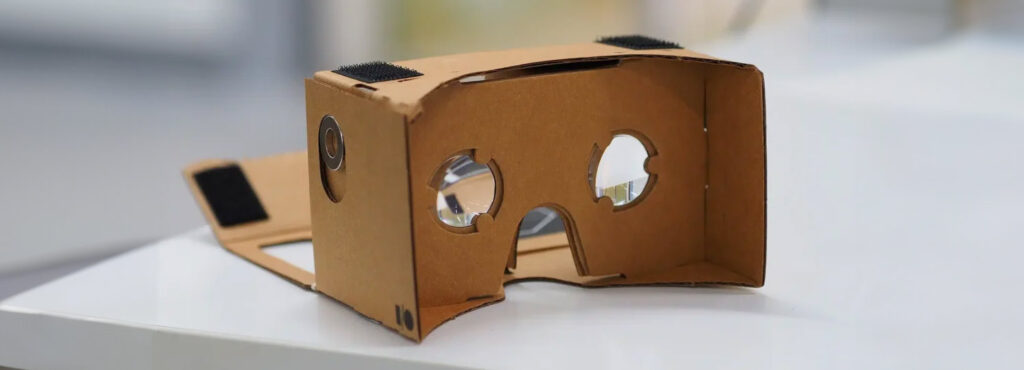

Devstars
The real estate sector is undergoing a revolutionary transformation thanks to the advent of frontier technologies. From virtual property tours to blockchain-based transactions, these innovations are not only shaping the present. Still, they are also paving the way for a more efficient and advanced future in real estate.

VR and AR are redefining the way we view properties. Virtual tours offer potential buyers a realistic view of properties from the comfort of their homes. At the same time, augmented reality adds a layer of enhanced interactivity, allowing them to visualise changes and modifications in real-time.
We don’t expect wide adoption for headsets outside of gaming enthusiasts just yet, but browser-based VR and the use of Google Cardboard can offer an easy entry point for this technology. Additionally, you can brand your own devices for a low price point (circa £20).

A few years back, we were invited to work on an MoD research project on VR/AR/XR technologies for training. There is a trickle-down from military applications, and we already see practical technology uses in this sector.
By embracing these technologies, estate agents can provide enhanced, efficient, and personalised services, making the property buying and selling process more interactive and engaging.
Blockchain technology introduces a new level of transparency and security in real estate transactions. With smart contracts, buying or selling properties becomes more streamlined and fraud-resistant, offering peace of mind to all parties involved.
In summary, blockchain has the potential to revolutionise real estate transactions by making them more secure, transparent, efficient, and accessible. However, it’s important to note that blockchain integration in real estate is still evolving, and regulatory and technical challenges need to be addressed as this technology matures and becomes more widely adopted.
AI and machine learning technologies are game-changers in the real estate sector. By analysing vast amounts of data, these technologies can predict market trends, aiding investors in making more informed decisions. They also play a crucial role in property valuation, ensuring accuracy and efficiency.
Integrating IoT in real estate leads to the creation of smart, connected properties. IoT devices contribute to energy efficiency, improved security, and enhanced living experiences, making smart homes a fast-growing trend in the industry.
Here’s a breakdown of the key advantages:
Big data analytics is reshaping how market analysis is conducted in real estate. By harnessing the power of large data sets, real estate professionals can gain deep insights into market trends, buyer preferences, and price dynamics, leading to more strategic decision-making.
3D printing technology is revolutionising the construction aspect of real estate. This technology accelerates the building process and introduces new possibilities in design and architecture, all while emphasising cost-efficiency and sustainability.
Drones have become essential in real estate, particularly in marketing and site surveys. Their ability to capture aerial views and conduct efficient land surveys has made them invaluable in providing accurate and detailed property insights.
The rise of autonomous vehicles will impact real estate development and urban planning significantly. This technology will influence the future of commuting and, subsequently, the location and value of properties.
The real estate sector is increasingly adopting green technologies to promote sustainability. From eco-friendly construction materials to energy-efficient designs, these initiatives are beneficial for the environment and attractive to the eco-conscious buyer.
Crowdfunding could democratise real estate investments, making them accessible to a broader audience. This approach allows individuals to invest in properties through online platforms, breaking down traditional barriers to real estate investment.
Cybersecurity has become a paramount concern with the digitisation of real estate transactions. Protecting sensitive data and mitigating online risks is crucial in maintaining the integrity of digital real estate dealings.
In conclusion, integrating frontier technologies in real estate is not just a trend but a necessity. As the sector continues to evolve, embracing these innovations will be crucial for those looking to lead and succeed in the future of real estate.
desc test
Virtual reality transforms real estate marketing by providing immersive property tours, allowing potential buyers to explore properties remotely and in detail.
Blockchain technology brings increased transparency and security to real estate transactions, streamlining the process and reducing the risk of fraud.
While AI can provide valuable insights into real estate market trends, it’s important to understand its capabilities and limitations.
AI, particularly machine learning models, can analyze large datasets to identify patterns and correlations in the real estate market. These datasets might include historical property prices, economic indicators, demographic shifts, and even consumer sentiment. AI can offer predictions about future market trends, potential property values, and areas likely to experience growth or decline.
However, it’s crucial to recognize that AI predictions are based on historical data and existing patterns. The real estate market is influenced by a myriad of factors. These including economic policies, environmental changes, and unforeseen global events. These (like a pandemic), can abruptly alter market dynamics in ways that historical data cannot predict.
AI can be a powerful tool for analysing and understanding trends. However, its predictions should be considered alongside expert human analysis and current market knowledge. AI’s role is to augment and enhance human decision-making, not replace it. For realtors, combining AI-driven insights with their own expertise and understanding can lead to more informed and strategic decisions.
IoT (Internet of Things) devices offer a range of benefits in the real estate sector, enhancing both the functionality and value of properties.
IoT devices in real estate offer improved efficiency, enhanced security, cost savings, and data-driven insights, making properties more attractive, functional, and valuable. However, it’s important to consider the initial investment costs and the need for ongoing maintenance and security measures to protect against cyber threats.
Send us a brief message outlining
your project and we’ll get back to
you asap to discuss your project
in more detail.